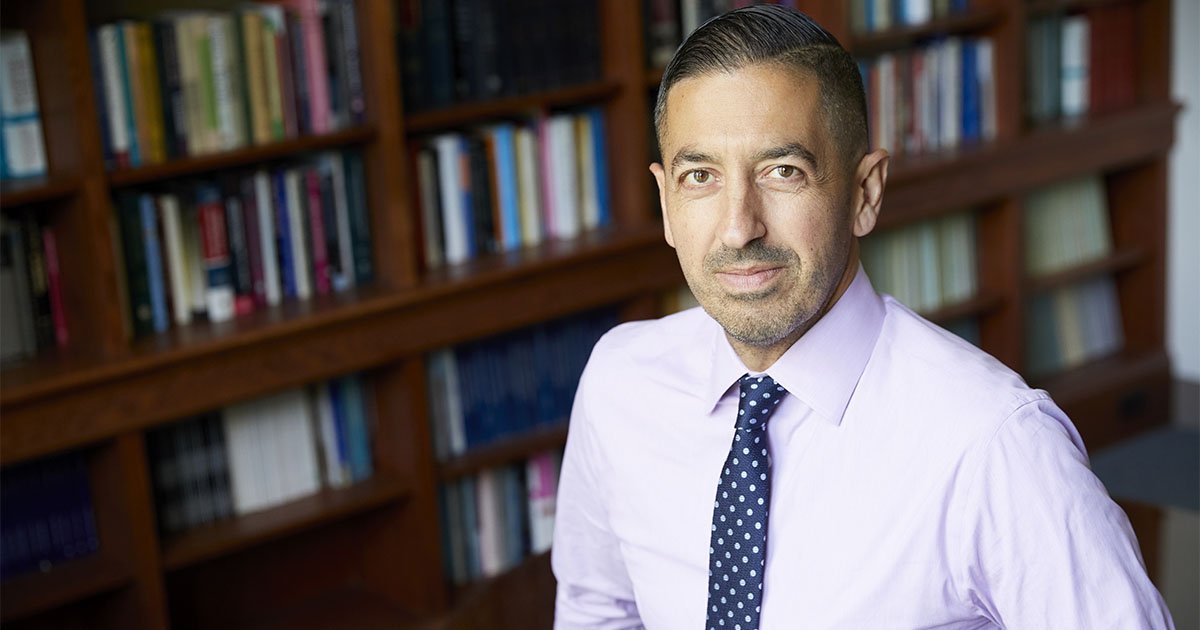Public-health scholar Sandro Galea has focused his lens on some of the world’s most notable conflicts. He has documented the traumatic consequences of events like the September 11 attacks, Hurricane Katrina, the American wars in Iraq and Afghanistan, and crises in sub-Saharan Africa. So when the COVID-19 pandemic revealed profound divisions in our society, Galea recognized familiar patterns. “Progress in public health depends on free speech, open debate, reasoned inquiry, and a tone of civility in our conversations about ideas and issues of consequence,” he wrote. Going forward, Galea says, “we need to return to an open-minded engagement with many voices, even those we may disagree with, to ensure our field is the best it can be.”
Galea, who will deliver the 2024 Gaylord Anderson Lecture on Feb. 27, is a physician, epidemiologist, author, and dean and Robert A. Knox Professor at Boston University School of Public Health. One of the most widely cited scholars in the social sciences, Galea has published more than 1000 scientific journal articles, 75 chapters, and 24 books. His extensive list of honors includes several lifetime achievement awards for his research, including the Rema Lapouse Award from the American Public Health Association and the Robert S. Laufer, PhD, Memorial Award from the International Society for Traumatic Stress Studies.
In advance of his visit to SPH, Dean Galea shared his perspectives on a range of issues and challenges facing the field of public health, including his view that an “inclusive vision of health rooted in compassion and justice” is one of the most impactful ways to influence public health.
How did the COVID-19 pandemic reveal cracks in the U.S. public health infrastructure?
Dean Galea: COVID exposed how our longstanding disinvestment in the public health system has left us less healthy than we could be and more vulnerable to health crises like pandemics. We cannot spend money on healthcare alone and expect to be healthy. We need to invest in the fundamental drivers of health—the social, economic, and political context that generates health—while also funding a robust public health infrastructure.
Why do you think “illiberalism” is so dangerous to public health? Can you provide an example?
Progress in public health depends on free speech, open debate, reasoned inquiry, and a tone of civility in our conversations about ideas and issues of consequence. These conditions emerge from a context of small-l liberalism. During the pandemic, we, at times, strayed from our liberal roots, as we saw, for example, when some who made arguments about COVID policy which dissented from prevailing views in our field were met with personal attacks rather than an engagement with the arguments themselves. Going forward, we need to return to an open-minded engagement with many voices, even those we may disagree with, to ensure our field is the best it can be.
What can public health practitioners do to secure a stable, successful future for public health in the U.S.?
We can continue to adhere to the liberal principles that helped advance much progress, getting us to where we are today. We can become better at engaging with people and arguments we disagree with. We can avoid the pitfalls of social media; the vitriol and moral grandstanding it can enable. We can work pragmatically towards a radical vision of a healthier world, guided by the virtues of moderation and good faith.
What blind spots do public health practitioners sometimes have when they are working in the field?
Public health practitioners tend to be deeply committed to a vision of a healthier world, motivated by the best of intentions. For this reason, it can be difficult for us to notice when our methods sometimes stray from our ideals, or when our ideological priors blind us to different views and approaches.
How does race and/or class impact public health outcomes, and how was this shown during the pandemic?
Race and class deeply affect health outcomes. Populations with less money, populations of color, and populations with less access to material and social capital often face poorer health. The pandemic exposed these divides. Such as, the gap in health outcomes between Black and white populations, with Black populations more likely to sicken and die from the disease. Creating a healthier country means addressing these inequities, so no one is excluded from being able to live a healthy life.
Are there any current programs, or bright spots, in public health that can show a path forward for the future of public health?There are many. Foremost in my mind are our students—the engaged, committed young people who come to our school each year intent on using their skills to build a better world. They are a continual source of inspiration and hope. Then there is the broader awakening we have seen in recent years to the inequities that undermine health in the U.S. and globally, coupled with a realization that our health is connected, that we really are all in this together. All this is cause for hope indeed.
What is the most impactful thing we can do to positively impact public health in this next century?
We can continue to pursue an inclusive vision of health rooted in compassion and justice, working slowly, steadily towards the realization of this vision, mindful that progress is possible even in times of challenge and that we all have the capacity to make a difference.
Join us for the 2024 Gaylord Anderson Lecture! Details below.
2024 Gaylord Anderson Lecture: “Within reason? Ensuring public health matters in coming decades”
Tuesday, February 27
McNamara Alumni Center – University Hall
Doors open at 3:30pm
Program begins at 4pm
Open to the public

